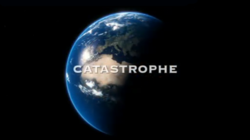| Catastrophe | |
|---|---|
 | |
| Genre | Documentary |
| Presented by | Tony Robinson |
| Country of origin | United Kingdom |
| Original language | English |
| No. of series | 1 |
| No. of episodes | 5 |
| Original release | |
| Network | Channel 4 |
| Release | 24 November – 22 December 2008 |
Catastrophe is a five-part British documentary television series telling the story of the catastrophic events that shaped planet Earth. It is presented by Tony Robinson and was first aired on Channel 4 on 24 November 2008. [1] The series producer was Stephen Marsh with researcher Rhodri Jones.
Contents
